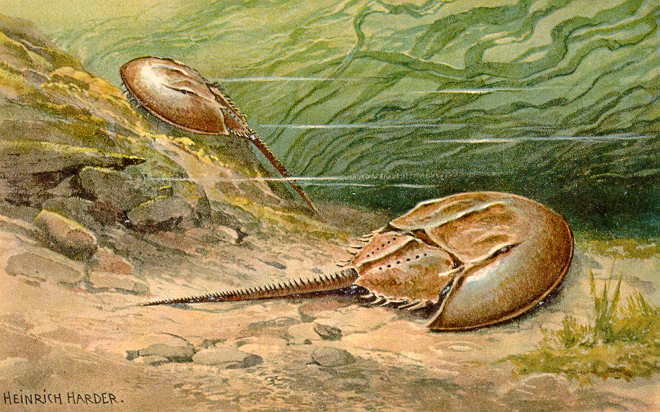The 200-million-year-old arthropod that saves lives
December 16th, 2017
Learn about the fascinating life history and characteristics of the arthropod that has walked with dinosaurs- the American horseshoe crab. Horseshoe crabs have been used in the biomedical industry and have saved thousands of human lives. Come see and touch horseshoe crab molts.

Credit: Painting by Heinrich Harder, 1916 (https://en.wikipedia.org/wiki/Horseshoe_crab)
Interviewing Justin
Where did you go to school?
B.S.-Michigan State University
Current- Stony Brook University
What is your area of research?
Marine population ecology
Who or what inspired you to become involved in marine science?
Jacque Cousteau and Sylvia Earle were the primary marine explores that inspired me to pursue a career in marine science. They exposed a myriad of different marine habitats and organisms to me, which further provoked my curiosity about the ocean world. Additionally, when I was younger, I would visit family in Florida every year and we would frequently visit the oceans. Observing the astounding diversity, and beauty that Florida marine fauna possesses filled me with awe. From then onward, I was hooked into marine science.
What qualities do you think are important in order to become a scientist?
For individuals pondering a career in science, I believe these following qualities are essential to become a scientist.
- Be passionate about your field. Motivation and interest is what pushes scientists to ask intriguing questions, conduct research, and find satisfaction with their work. Passion also helps scientists to endure the arduous and tedious tasks associated with science that may not be enjoyable, but may be necessary to achieve the product/result. Try to explore different scientific fields and find your true interests.
- Manage your time wisely. Scientists often work more than the typical 40-hour work week because many scientists typically teach, conduct research, read papers, write papers/summaries and apply for research grants to obtain money to conduct projects- sometimes concurrently. The workload of science is often demanding, but if you truly enjoy the duties of a scientists, then you will never feel like you worked a day in your life.
- Critical thinking and problem solving are necessary qualities for scientists to possess. Without these qualities, the scientific process (answering a question, forming hypothesis, etc.) would not be a robust method for understanding the natural world and solving problems. Science is contingent upon logic and objectivity to truly find solutions to many modern problems and propel technological advancements. Critical thinking can also generate novel ideas that may help provide new solutions to pervasive and contemporary issues.
Why is your research topic important?
Horseshoe crabs have been declining along the US east coast in recent decades from overfishing, human development and biomedical exploitation. Horseshoe crab eggs are a crucial food resource for many migrating shorebirds (i.e. sandpipers, red knot, etc.) during the spring months. Additionally, the biomedical industry harvests thousands of horseshoe crabs each year to extract a compound known a LAL, which is used to detect bacteria in human medical supplies. Horseshoe crabs are heavily fished along the US East Coast for bait in the whelk and eel fisheries. As you can tell, horseshoe crabs are not only important for ecological purposes, but for human purposes as well. My research will assist the formulation of more robust horseshoe crab management decisions by enhancing the knowledge base of these “living fossils” and will hopefully help make horseshoe crab populations sustainable.
What will you be bringing with you to the “meet with an Oceanographer” day?
– Horseshoe crab molts
– USFWS button tags for mark-recapture survey
– Posters
– Trilobite fossil
– Coloring sketches
– Colored pencils/crayons
What is the best advice you have for people interested in becoming involved in your field of research or in marine sciences?
Take as many math, science and writing courses as possible. Math is heavily involved in science because many results and scientific formulas require the use of stats or math to analyze and make inferences from the data. If math is intimidating, try to take things slowly, practice, and try to get as much help as possible- don’t let math deter you from science. These classes further help build your critical thinking skills- an essential quality among scientists. Writing is also an important skill scientists must master. Scientific writing is essential for applying for grants, writing papers, and most importantly, communicating your results to the public and scientific community.
Get involved and start early. Attend marine science camps in middle and high school. Volunteer at your local marine science institution, a research lab, local aquarium, etc. during high school and college. The sooner you get involved- the more experience you gain and can put you at an advantage compared to other students when applying for schools and jobs. Additionally, gaining experience will help you decide if marine science truly interests you. Try to work harder than everyone else!
Try to find an area of marine science you are most interested in. For instance, are you interested in marine biology, or are you more interested in the chemical and physical characteristics of the world’s oceans? Are you interested in coral reefs, seagrasses, fishes, crabs, etc.? Try to find experiences that are relevant to your interests. Once you find your interests, do not lose sight of the “big picture”. Not specializing too much will keep you flexible in a changing job market.
What is your favorite ocean organism?
Blue Marlin (Makaira nigricans)